Dear friend of Shelburne Farms,
After many years of milking cows at the dairy, I still enjoy waking early and heading to the Farm Barn office before the rest of the farm gets going. In the summer, I also enjoy getting out to meet people who are here to experience the programs, farming, and activities that are happening every day.
Shelburne Farms is both an educational idea and an amazing place dedicated to the vision of a sustainable future. It’s the mix of activities we engage in and how they all fit together that I find so inspiring. We don’t presume to have all the answers, but we are committed to exploring together what a sustainable future means and looks like, and to having our programs and practices reflect that.
The community of friends of Shelburne Farms supports us in many different ways that make everything we do possible. Thanks for being a part of it.
With deep gratitude,
Alec Webb, President

Planting Trees for Marshall—and the climate
Late this spring, we planted 200 native trees on the western slope of Sheep’s Knoll, to be known as “Marshall Woods.” These three acres along the Butternut Hill woodlands are a lasting tribute to Shelburne Farms co-founder Marshall Webb and his climate vision. The area will be an inspiring focal point for our ongoing climate initiatives to achieve Net Zero by 2028, and a particular reminder of the key role of forests and soils in combatting climate change. Marshall Woods is a mix of young maple and oak saplings, as well as climate-adapted southern trees, like Tulip Poplar and Northern Catalpa. Temporary fencing will keep browsing deer at bay until the young trees have found their footing.
Come stroll the new path through the plantings, enjoy the new bench and its views, and imagine the future forest, and the future we’re building together.
More about Marshall Woods online.
What is Net Zero?
The point when we will be capturing more greenhouse gases than we are producing on campus. Our climate action plan is guiding us there. What’s your climate action plan?

SUMMER 2023
ANDREA ESTEY Summer Newsletter | 2024
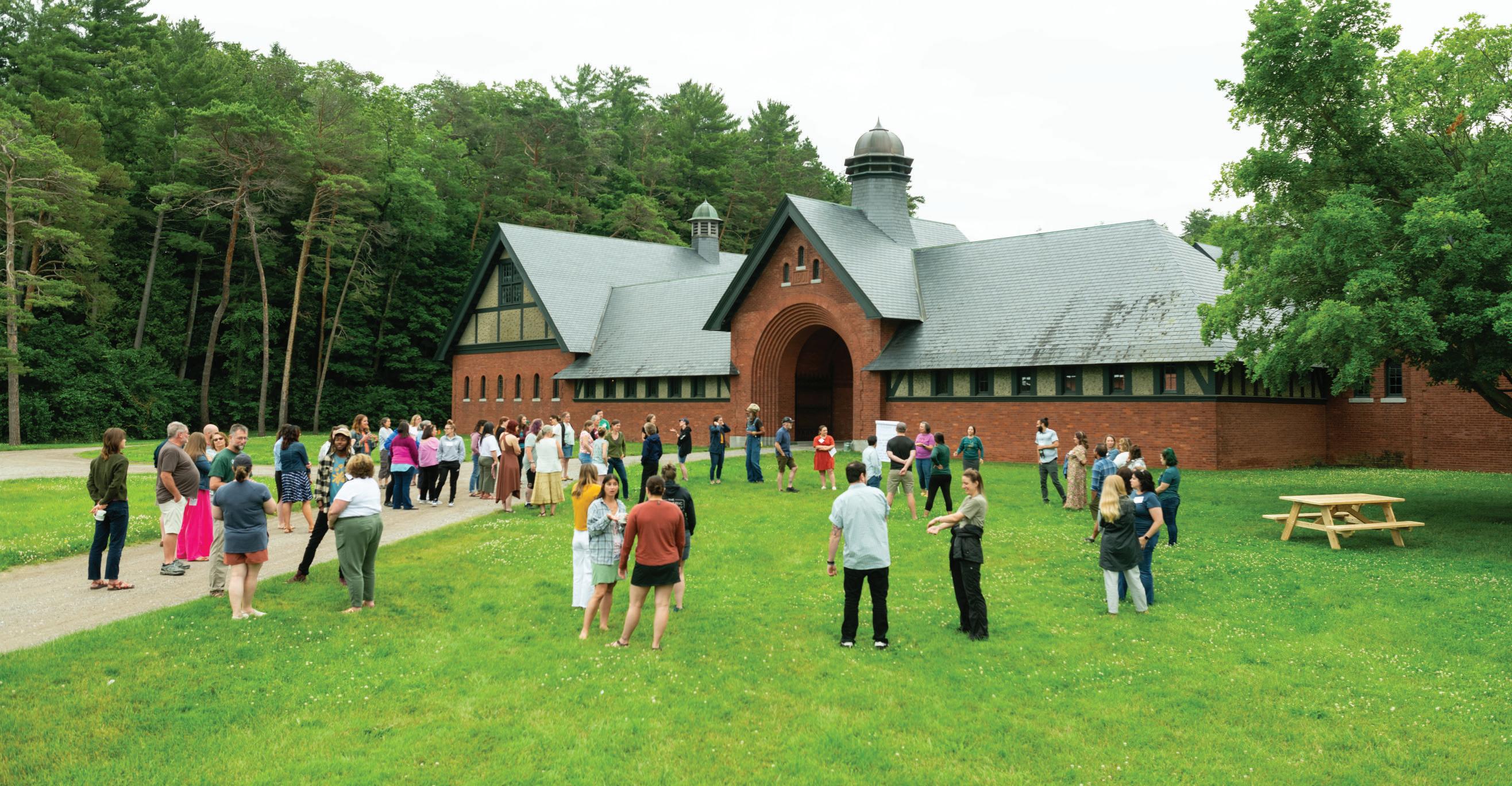
News from the Shelburne Farms Institute for Sustainable Schools, and what’s on the docket for the upcoming summer season.
The Coach Barn
After a summer of educator gatherings (see listings, p.5), rehabilitation of the Coach Barn will begin in August to make the historic barn an even more inspiring gathering center for educators and the community. It will receive electrical upgrades, a new teaching kitchen, and a geothermal heating system.
New! Learning Locally, Transforming Globally
LEARNING LOCALLY, TRANSFORMING GLOBALLY



thored
Our Farm to School Director Betsy Rosenbluth co-authored a chapter in the just-released book, Transforming School Food Politics around the World, edited by Jennifer E. Gaddis and Sarah A. Robert.
Students from Nepal to Vermont have been using a new resource from our Institute for Sustainable Schools to address global challenges in their own communities. Learning Locally, Transforming Globally engages learners step by step to make change on a local or regional level via a school or community action project that’s tied to reaching the United Nations Sustainable Development Goals: 2030 targets for economic, social, and ecological systems improvement.
Learning Locally is designed for K–12 educators in formal and informal education settings.
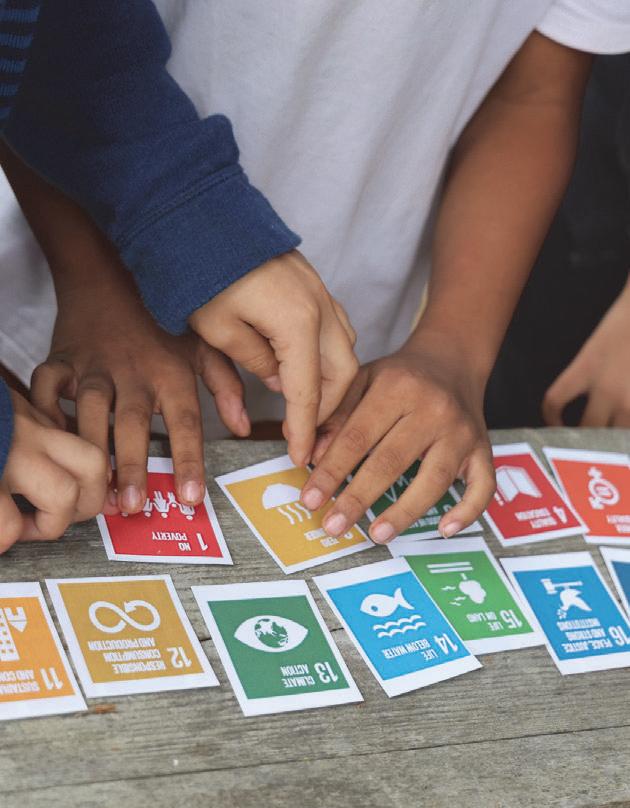
shelburnefarms.org/lltg
“Tackling complex, global issues like climate change or poverty can be overwhelming for young people. Implementing local solutions gives them a place to start. It demonstrates that they have the power to make a difference.”
— Jen Cirillo, Director of Professional Learning and co-author
A Project Guide for Educators and Youth to Advance the UN Sustainable Development Goals
O D B
2
ANDY DUBACK
A few of the teachers who inspire us!

“I use farm to school to reshape food systems and as a way to hand the reins to a new form of leadership. Doing that through education, I think, is really powerful. [The Adaptation Program] reinforces the importance of facilitation: we don’t have to have the answers, but we help guide folks to what is important for them—to what makes sense for them locally.”
— Pantaleon Florez III Lawrence Public Schools, KS Farm to School Institute Adaptation Program
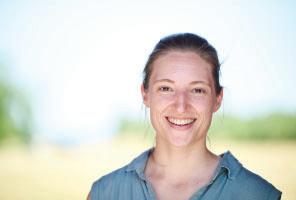
“I teach our climate curriculum, and we know it’s most effective if students feel connected to their place. The Climate Resiliency Fellowship supported me through the challenges of this work. In my Fellowship year, I helped establish a district-wide partnership with the Stowe Land Trust, and I’ve kept the momentum going this year by working to provide all of our students access to outdoor learning.”
— Gerlisa Garrett Science Teacher, Stowe Middle School, VT Climate Resiliency Fellow
Transforming Farm to School
In June, we will welcome 12 teams for our annual Northeast Farm to School Institute.* It’s the kickoff to a year of developing and implementing farm to school action plans that tie together classrooms, cafeterias, and local communities.
Since food is the focus of farm to school, teams always enjoy collaboratively preparing dishes during the kickoff. Below is a recipe they often make that you might enjoy making this summer, too!
*a program of Vermont FEED, our partnership with NOFA-VT
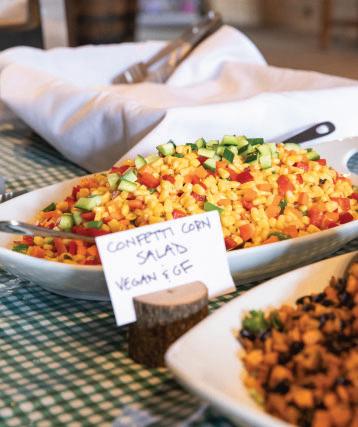
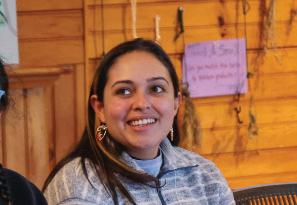
“This workshop took me on a rollercoaster of curiosity. I thought about my organization, my life and intentions, and how to focus on future goals. This place has provided me peace of mind, clarity, new ideas for forest education, and it’s reinforced the importance of advocacy.”
— Keilly Solano, Common Ground Community Programs, New Haven, CT ABCs of Farm-Based Education
2024 Adaptation Teams Previous Adaptation Teams
At the kickoff, we invite “Adaptation Teams,” groups from various states eager to learn about and adapt this model to their own region. Their number is growing!
Confetti Corn Salad
Ingredients
2 bell peppers
2 celery stalks
1 medium carrot
¼ C cider vinegar
2 ½ Tbsp olive oil
1 ½ Tbsp brown sugar
½ tsp dried oregano
Salt and pepper to taste
½ tsp freshly grated orange zest
1 lb fresh or frozen (thawed) corn kernels
Method
Yield: about 6 cups
1. Stem, core, and seed peppers. Cut into ¼-inch dice.
2. Trim celery and cut into ¼-inch dice.
3. Trim and peel carrots. Cut into ¼-inch dice.
4. Whisk together vinegar, oil, sugar, water, oregano, salt, and orange zest in a bowl.
5. Mix peppers, celery, carrots, and corn in a large bowl. (Add in any other in-season veggies you’d like, too.) Drizzle with dressing and toss to coat. Let stand for 15 minutes to one hour before serving to allow flavors to combine.
BEAR CIERI, A. DUBACK, A. ESTEY SARAH WEBB 3

Visiting Shelburne Farms



Walking Trails
Popular destinations on our miles of trails include the Farm Barn, Lone Tree Hill, and the Flower Gardens. Check out Marshall Woods, too! (see p.1) If walking is not an option for you, you can obtain a driving pass on our website or at the Farm Store.
Farm
Store & Welcome Center
Come in and say hello! Get your questions answered and pick up fresh products from our farm and other Vermont farms: cheddar, maple syrup, fruit, vegetables, meats, and more. Supporters receive 10% off their purchases.
Shelburne Farms Inn
May 10-October 22, 2024
Make your online reservation for an overnight stay or a farm-to-table dining experience (breakfast and dinner), or simply walk our trails to enjoy the Flower Gardens.
shelburnefarms.org/inn
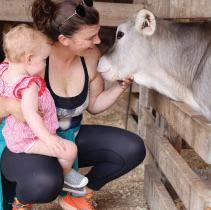
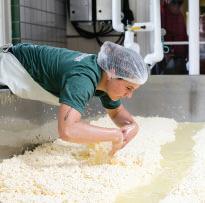
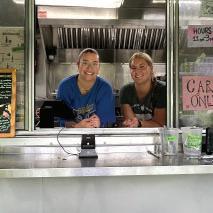
Farm Barn Fun
Tractor shuttle runs daily from the Farm Store, May 11–Sept. 2; then weekends through Oct. 20.
Children’s Farmyard
Meet our sheep, goats, rabbits, cow, calves, and pigs. Learn about how they contribute to a working farm. Scheduled activities each day.
Cheesemaking
Watch the cheesemakers crafting our Brown Swiss cows’ milk into cheddar.
Meet a Cheesemaker: Daily, 11am
Raptors in Residence | 1pm
May 11–June 9: Sunday
June 15–Sept. 2: Wed., Fri., Sun. Sept. 7–Oct. 13: Sunday
Learn the mysteries of birds of prey with a live owl or hawk. Offered by Outreach for Earth Stewardship.
Farm Cart | 11am–3pm
May 11–June 9: Sat. & Sun. June 15–Sept. 2: Daily
Sept. 7–Oct. 13: Sat. & Sun. Enjoy farm-grown lunch and snacks in simple dishes that feature produce and products grown here and at other nearby farms.
DARIA BISHOP, ANDREA ESTEY, BRENT HARREWYN, SARAH WEBB 4
ANDREA ESTEY
Seasonal Tours
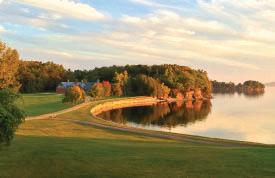
Shelburne Farms Tour
Daily throughout the summer
On an open-air wagon tour, explore the stories of Shelburne Farms and its evolution from a private estate to an education nonprofi t.
Sun to Cheese Tour
Daily throughout the summer
Discover the story behind our farmstead cheddar on an open-air wagon tour to our cows, pastures, dairy, and cheese facility.
House & Garden Tour
Sun., Tues., Wed. through Oct. 18
Enjoy a guided, in-depth walking tour of the Inn’s main floor, upstairs bedrooms, and flower gardens.
What Kind of Ancestor Do You Want to Be?
June 6 | Thursday
Join Dr. John Hausdoerffer as he shares from his 2021 co-edited book of the same name, which brings together Indigenous and other voices to explore what we give our descendants. With EcoGather at Sterling College.
Coming Home: Discovering Oneself in the Family Legacy with Lacretia Johnson Flash
June 11 | Tuesday
Join Dr. Lacretia J. Flash as she reflects on her journey of discovery, healing, and transformation, tracking her family’s fascinating legacy of slavery and land stewardship and her own connections to Shelburne Farms.
The Art & Science of
Herbal Tea June 18 | Tuesday
Savor the delicate flavors of summer for an afternoon teatime at the Inn’s North porch, overlooking the lake and flower gardens. With Spoonful Herbals.
Summer Concert Series
July 10–August 21 | Wednesdays
Set up your lawn chair and blanket, bring a picnic dinner or enjoy food for sale on site. Live musical performances for the whole family! The first 3 concerts are part of the Town of Shelburne’s 27th summer concert series, sponsored by Al Martin Volvo.
Bats in the Barn
July 18 | Thursday | for families
Learn what makes bats so special with Barry Genzlinger, aka “Barry the Bat Guy,” and watch the bats’ evening flight from the Farm Barn. With the Vermont Bat Center.
Vermont Fresh Network
26th Annual Forum Dinner
July 21 | Sunday
Some of Vermont’s best chefs, farmers, and food producers create a sensational summer meal.
Summer Forest Bathing
July 20, August 24 | Saturdays
Slow down and be guided by a Nature Connection Guide through a series of sensory invitations.
Vermont Cheese Council’s Cheese Week
September 8–14 | Statewide
A statewide celebration of Vermont cheese producers. See p. 6 for our events. For statewide events, visit: vtcheese.com/cheeseweek
For more on programs, graduate certificates with the University of Vermont, and graduate credits: shelburnefarms.org/summer24
Northeast
Farm to School Institute
Year-Long | Kickoff: June 25–27
School teams build action plans for lasting impact on their school communities.
Farm to School Institute
Adaptation Program
June 24–28
States learn from this proven model for growing robust farm to school programs.
Foundations in Education for Sustainability
July 8–12
Learn systems and strategies to amplify youth voice and agency for positive change.
Cultivating Joy & Wonder
July 15–19
An immersive, energizing week to inspire your early childhood curriculum.
Immersion in Education for Sustainability
July 23–25
A retreat-like workshop to reflect, learn, and collaborate with colleagues.
Watershed for Every Classroom
Year-Long | Kickoff: July 16–19
For educators in the Lake Champlain Basin: New York, Vermont, Quebec.
Education for Sustainability
Leadership Academy
Year-Long | Kickoff: July 30–Aug. 1
Aligning education for ecological integrity, economic vitality, and social justice.
Climate Resiliency Fellowship
Year-Long | Kickoff: Aug. 13–15
Deepen your teaching practice and advance education for climate action.
ABCs of Farm-Based Education
Many thanks to all of our partners who make these programs possible.
Many thanks to all our partners who make these and all our programs possible.
October 22–24
Inspire your existing farm education programs or begin building new ones.
SUZANNE FAY 5
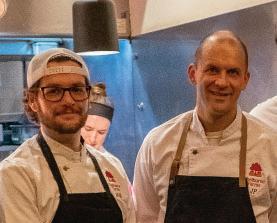
From the Inn
“After
the winter’s quiet, I really welcome the energy of reopening. The excitement of inviting guests back is something I look forward to every year. And serving fresh strawberries? It doesn’t get better than that.”
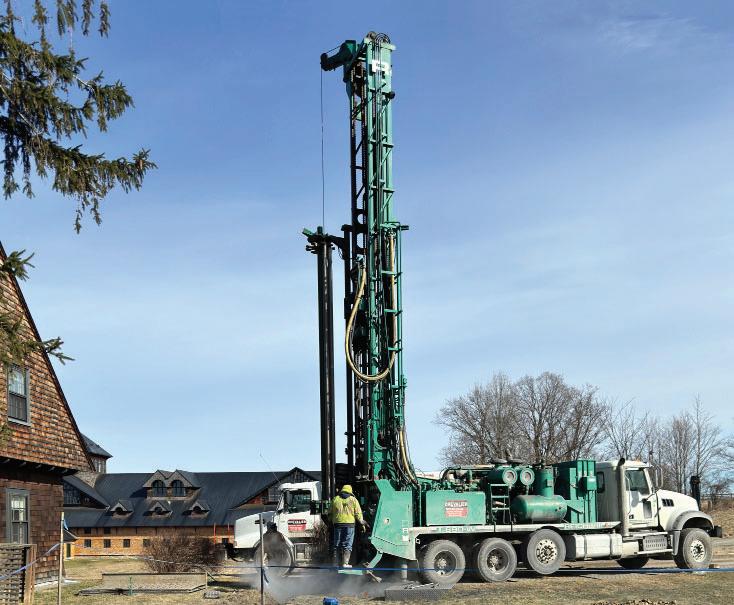
Moving to Net Zero
Our first geothermal heating system
Chef de Cuisine Matt Merrifield (L)
— John Patterson Shelburne Farms Executive Chef with
Vermont Cheese Council Cheese Week
SEPTEMBER 8-14
During this week-long series of events and workshops with producers across Vermont, we’re featuring:
The Art and Science of Cheddar Making
September 9 | Monday
Make a Cheese Board
September 10 | Tuesday
Pasture Walk
September 14 | Saturday
Cheese Sensory Exploration
September 14 | Saturday
We’ll also be offering our daily Sun to Cheese Tours, activities in the Children’s Farmyard, and more.
See all Shelburne Farms’ events: shelburnefarms.org/calendar
This spring, we drilled holes for our first geothermal heat pump system—a technology for heating and cooling homes. Heat pumps are 50-70% more energy efficient than comparable home heating systems and are powered by electricity rather than by fossil fuels. Since Vermont’s electricity is largely carbon-free and we have 30+ buildings to heat across our campus, we’ve made switching to heat pumps a priority in our Climate Action Plan.
Like all geothermal heat pump systems, the one at Vineyard Cottage will circulate a water solution through pipes below the soil’s frost zone, where temperatures hover around 55°F year-round. Depending on the time of year, the solution either absorbs heat from the surrounding earth and carries it to an above ground heat pump to warm your home, or it releases heat to the earth to help cool your home.
Next up for receiving a geothermal system? The Coach Barn! (see p. 2)
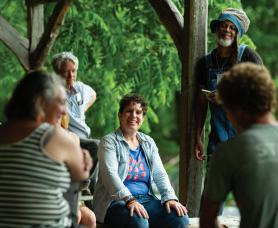
Climate Farm School for Farm-Based Educators
This fall, we’re partnering with the Farm-Based Education Network and Climate Farm School to offer a “Climate Farm School” for farm-based educators. While our climate action education work runs deep, it’s our first collaboration of this kind. We’re excited to welcome farmbased educators here to the farm, and to connect online for additional learning. It’s all to energize them to develop action plans that will help their students change food and agricultural systems for the sake of the climate.
KATE MORRISON WALLY ALLEN
A team drills holes to place upright pipes for our first geothermal heating system. A solution will circulate through the pipes to absorb the earth’s heat to warm Vineyard Cottage.
6
ANDY DUBACK
How
are you responding to the more unpredictable weather patterns brought on by climate change?
We asked our farmers how they’re adapting. Here’s what they said.
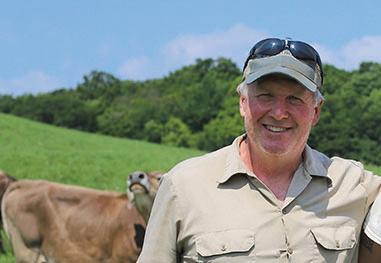
“We have to watch the weather and be ready to respond quickly when conditions are right. The 2023 season was a great example. The first cut of hay used to happen around Memorial Day. But all our equipment was ready to go on May 11 and so was the grass. So we said, ‘Let’s go!’ We put up 1,300 bales of really nice hay by June 1, before it started raining. Every farmer who waited got caught. We’ve also been utilizing more land than a farm our size would typically need (we’re lucky to have the land). It gives us a cushion to bail up extra grass in a dry year.”
— Sam Dixon Shelburne Farms Dairy Manager
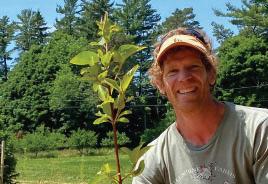
“In farming, you’re always at the will of mother nature, but we are adapting more now in a few major ways. We’re improving our soil health and resilience by tilling less, seeding cover crops, rotating crops and adding farm-made compost, and covering idle plots with tarps. We’re growing more crops under unheated tunnels covered with plastic sheathing, which makes it easier to keep plants warm, dry, and watered, and extends our growing season. And we’re growing a diversity of crops over the entire season, with multiple successions, so if one plant does poorly, another may thrive.”
— Josh Carter
Shelburne Farms Market Gardener
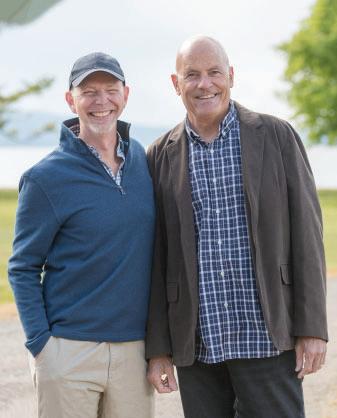
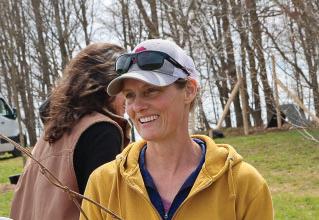
“Most of our trees are resilient to weather events because they’re native. They’ve been here a long time and they’ve been through it. But when you start layering on multiple stresses, like drought plus disease, trees are definitely going to take a hit. So we need to be really mindful of having that next generation of healthy trees ready to take over, which is hard here because our mature stands don’t have a strong understory. When we mark trees for harvest, though, we think about how to favor climate adaptive species, like oaks and hickories to give them more space to grow.”
— Dana Bishop Shelburne Farms Woodlands Manager
With Your Support
“I first visited in 1994, and my love for Shelburne Farms continues unabated to this day. My husband Alex and I cherish its educational mission and beauty. The trails through carefully tended fields and forests are a testament to the dedicated staff, and make Shelburne Farms such a treasure.”
— Marc Vincent
Marc Vincent and Alex Nalbach have made a special gift in 2024 to help Shelburne Farms remain accessible to all.
JOIN MARC & ALEX! Support the farm using the enclosed envelope or go to shelburnefarms.org/support. Thank you!
DARIA BISHOP
HOLLY BROUGH, ANDREA ESTEY 7
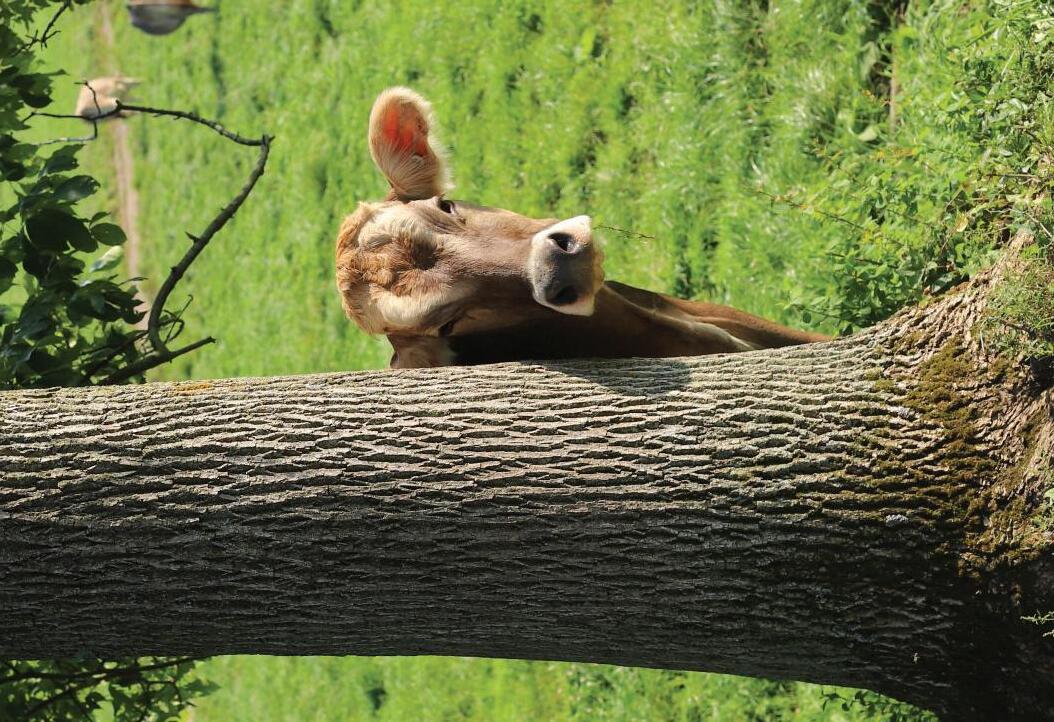
1611 Harbor Road • Shelburne, Vermont 05482 shelburnefarms.org • 802-985-8686 COVER PHOTO: HOLLY BROUGH Shelburne Farms is an education nonprofit on a mission to inspire and cultivate learning for a sustainable future through its programs, place, and products. We offer transformative learning experiences to help educators, students, and visitors create a more thriving world.
is a 1,400-acre diversi
ed
located on
unceded, traditional,
Abenaki. Summer Newsletter | 2024
Shelburne Farms’ historic campus
fi
working farm
the
and contemporary homelands of the Winooskik band of the



























